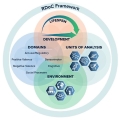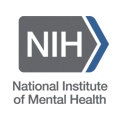The NIMH Strategic Plan for Research was initially published on May 19, 2020, and was last updated on May 29, 2024. NIMH is currently updating this Strategic Plan to ensure it is aligned with the current Administration’s priorities and complies with this Administration’s Executive Orders. The updated version will be posted once available.
Progress for Goal 4
Learn about the progress NIMH has made toward Goal 4 of the NIMH Strategic Plan for Research: Advance Mental Health Services to Strengthen Public Health.
- Primary Care Can Play Key Role in Suicide Prevention
-
Adding suicide care practices to routine adult primary care visits reduced suicide attempts by 25% in the months after the visit.
- Improving Firearm Safety in Pediatric Primary Care
-
An automatic reminder supported by low-burden facilitation increased delivery of a universal secure firearm storage program during pediatric primary care.
- Understanding the Availability of Mental Telehealth Services
-
In an NIMH-funded study, researchers examine the availability and structure of mental telehealth services.
- Basic Research Powers the First Medication for Postpartum Depression
-
Decades of NIMH-supported basic research led to a pioneering treatment for postpartum depression and continues to power exciting advances in women's mental health care.
- Revolutionizing the Study of Mental Disorders
-
The Research Domain Criteria Initiative (RDoC) represented a new way to conceptualize the study of mental illnesses. In celebration of NIMH's 75th Anniversary, we reflect on the beginning and progress of this initiative.
- Using Games to Explore the Mind
-
The National Institute of Mental Health (NIMH) and the non-profit organization The Many Brains Project partnered with the National Institutes of Health (NIH) All of Us Research Program to adapt a series of new game-like tasks that are now part of the All of Us Research Program’s participant experience.
- Saving Lives Through the Science of Suicide Prevention
-
Evidence-based efforts to improve suicide risk screening, assessment, and intervention are helping to save lives, thanks to research supported by NIMH.
- Emergency Department Intervention Reduces Adult Suicide Risk
-
Evidence-based practices for suicide prevention effectively reduced suicidal behaviors among adults seen for care in emergency departments.
- RAISE-ing the Standard of Care for Schizophrenia: The Rapid Adoption of Coordinated Specialty Care in the United States
-
The Recovery After an Initial Schizophrenia Episode research initiative, launched by NIMH to test the effectiveness of coordinated specialty care to treat first-episode psychosis, has transformed the mental health landscape in the United States and helped thousands of people with schizophrenia achieve better outcomes.
- Youth Emergency Department Visits for Mental Health Increased During Pandemic
-
Hospital visits for urgent mental health care increased among children and teens in the second year of the COVID-19 pandemic, according to an NIMH-supported study.
- Medicaid Data Show Wide Differences in Mental Health Care in the United States
-
A new NIMH-supported study revealed differences in rates of mental health care among Medicaid enrollees based on where they live in the United States.
- Multistage Autism Screening in Early Intervention Settings May Reduce Disparities
-
An NIMH-supported study shows that incorporating a multistage screening process for autism spectrum disorder (ASD) into federally funded early intervention services may reduce disparities in early ASD diagnosis.
- NIH Initiative Expands Access to Resources for Early Psychosis Treatment and Research
-
The Early Psychosis Intervention Network (EPINET), an NIMH initiative aimed at determining how to best provide treatment for individuals experiencing symptoms of early psychosis, is increasing access to resources for researchers, providers, and families through a growing network of research hubs and a new website.
- NIMH Awards Funding for Research on Preventing Firearm Injury and Mortality
-
Suicide attempts by firearm are especially dangerous, with as many as 9 out of 10 attempts resulting in death. NIMH is supporting three projects focused on preventing and reducing firearm injury and mortality to help address the critical need for more research in this area.
- Emergency Drug Overdose Visits Associated with Increased Risk for Later Suicide
-
A new data analysis has found patients who visited the emergency department for an opioid or sedative/hypnotic drug overdose were at higher risk of dying by drug overdose or suicide in the year after being discharged relative to the general population.
- Developing Rapid, Accurate Assessment of Mental Disorders, Suicide Risk in Youth
-
For many adults who have a mental disorder, symptoms were present—but often not recognized or addressed—in childhood and adolescence. Early treatment can help prevent more severe, lasting impairment or disability as a child grows up.
- Using Technology to Help Predict Binge and Purge Episodes in People with Eating Disorders
-
In binge-eating disorder and bulimia nervosa, people experience recurrent and frequent episodes in which they eat unusually large amounts of food and feel a sense of loss of control.

















